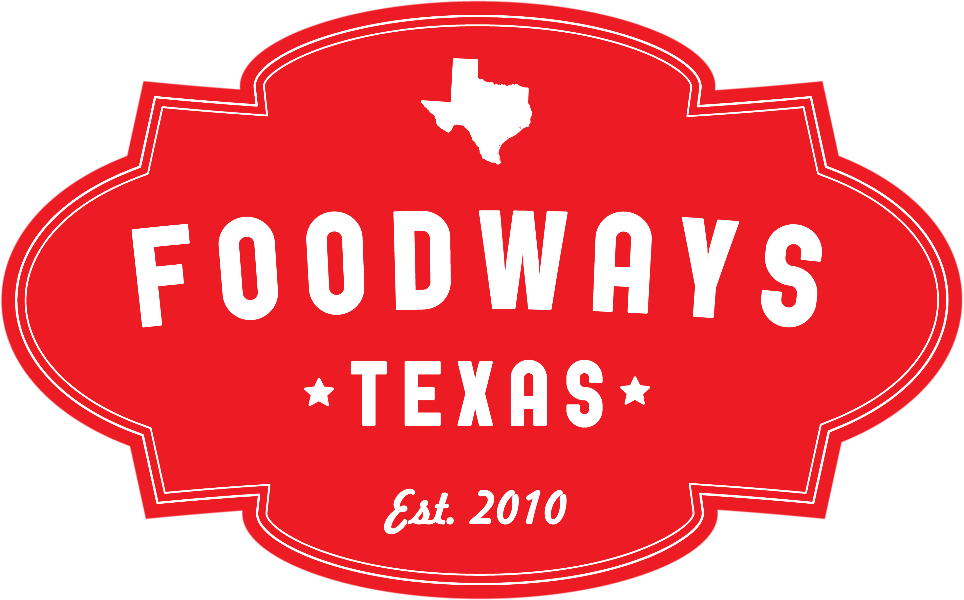Interviewer: Rien Fertel
Location: 514/519 East Highway 90A, Richmond, TX 77469
This interview is a production of Foodways Texas. Photos by Denny Culbert.
Lolo Garcia claims to be the architect of both the smoked brisket-filled tortilla and the brisket and egg taco. He’s certainly one of the first to present the combo to customers.
Garcia’s Plantation BBQ (since 1987) is a food trailer parked along a busy industrial highway in Richmond, Texas. The twelve-hour briskets are prepped, smoked, and sliced in the tiny confines of the trailer. Fresh scratch-made tortillas, pico de gallo, and fried eggs, round out one of the most inventive tacos in the area.
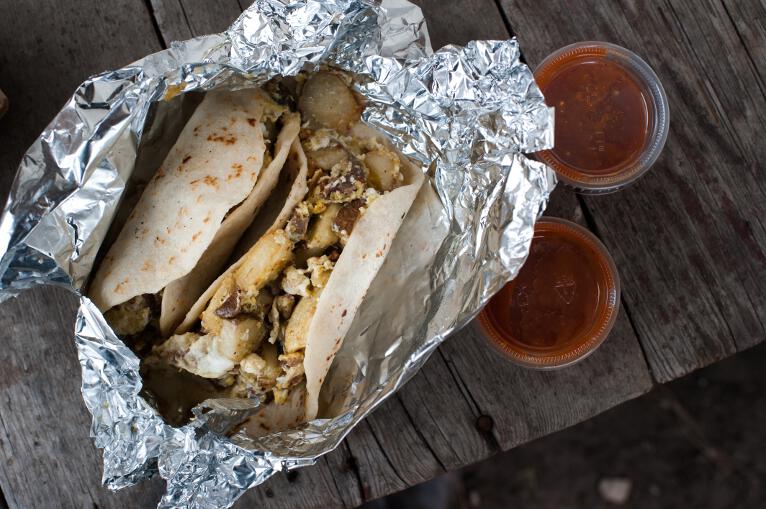
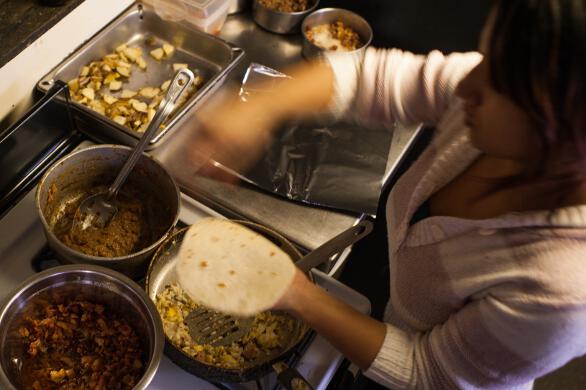
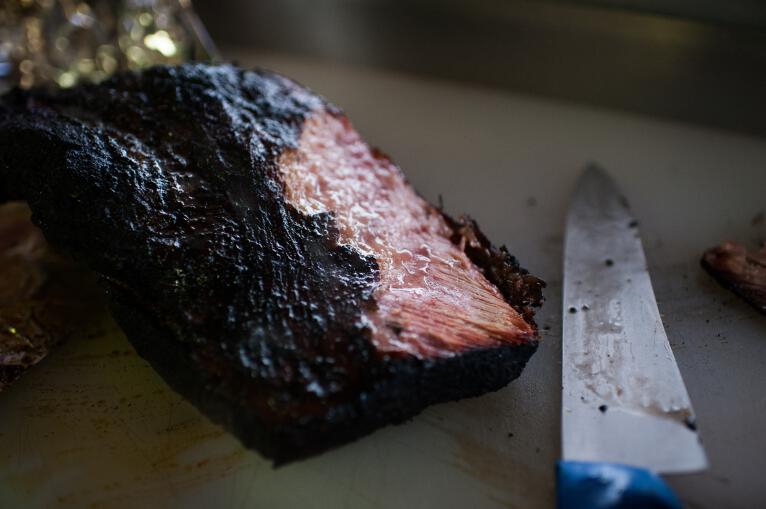
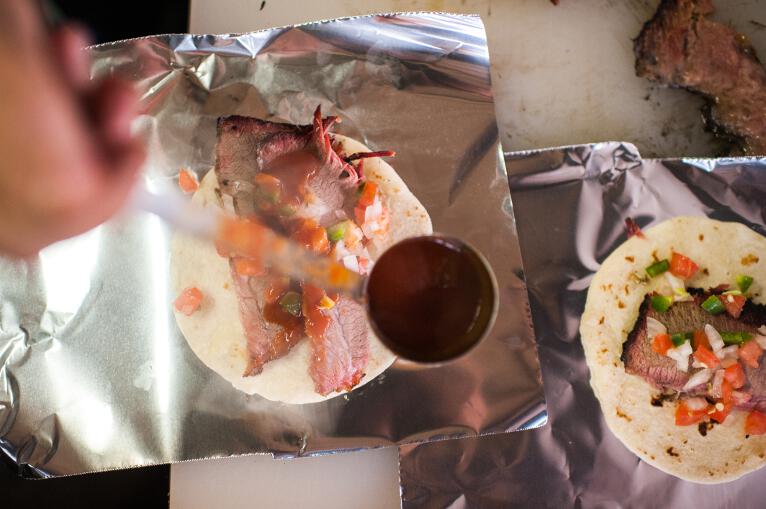
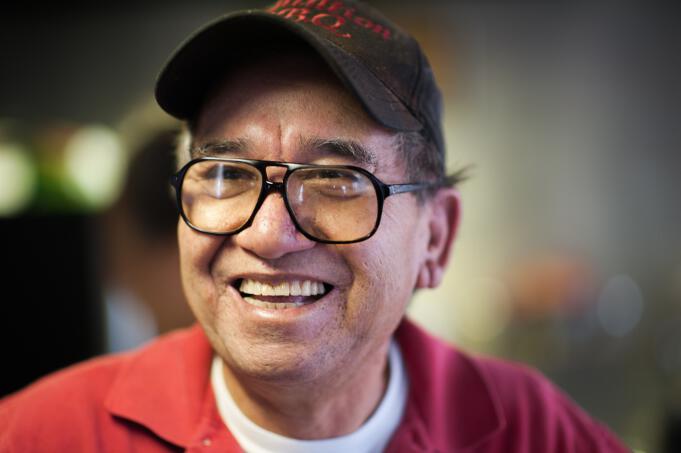
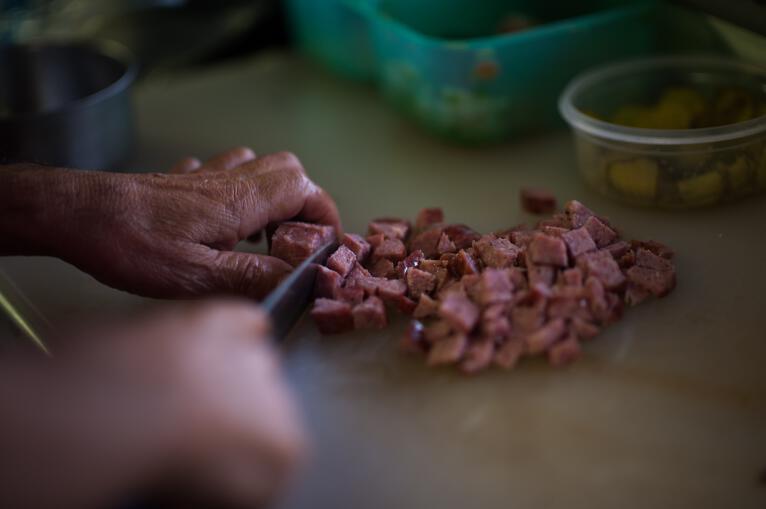
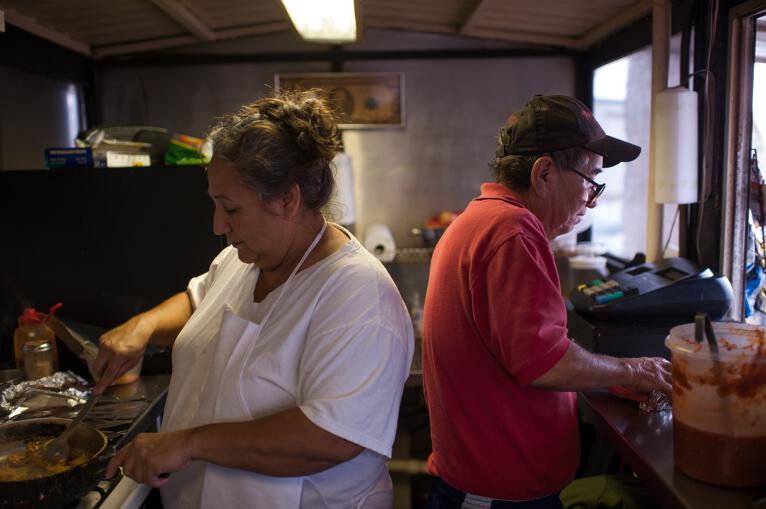
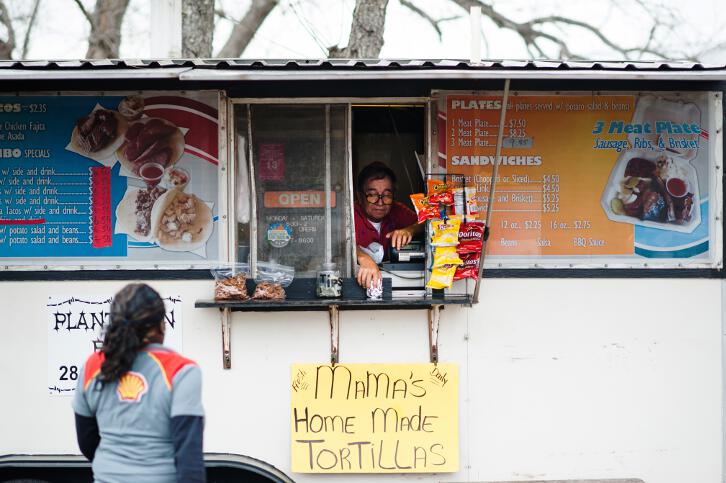
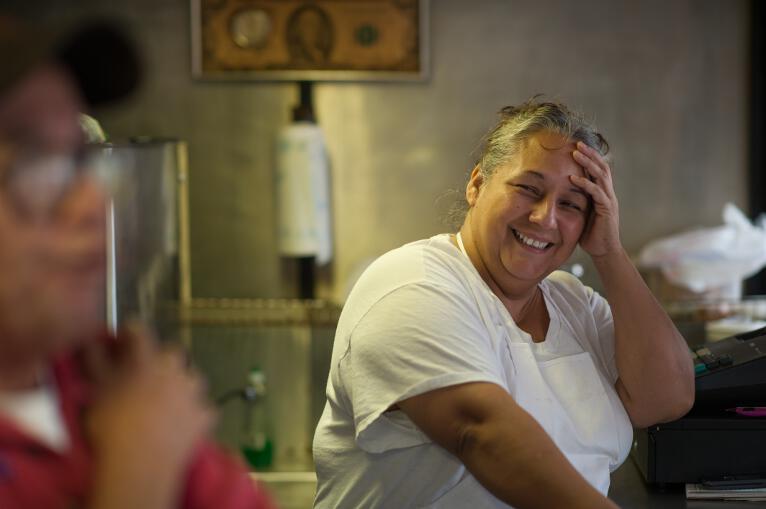
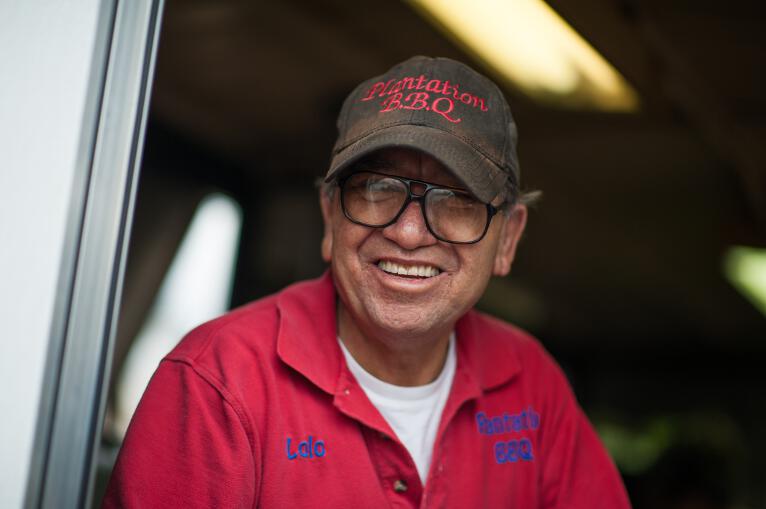
RIEN FERTEL (RF): Check, check. Alright, this Rien Fertel with Foodways Texas. It is Friday, January the fourth, about ten minutes to eleven [10:50] in the morning. I’m in Richmond, TX—in the food trailer that is Plantation BBQ, and I am going to interview Mr. Lolo Garcia, and have him introduce himself now.
LG (LG): Hello, I am Mr. Garcia, Lolo Garcia, I am the owner from the Plantation BBQ. I am the one that makes the famous brisket, and everybody loves it, especially the brisket taco. And they know, because he just tried it, and he loved it. [Laughter]
RF: I did, I did, and please— [Laughter] give me your birth date first, please.
LG: January the first, forty-seven.
RF: Alright, well, happy birthday, and—let’s talk about your brisket.—Why brisket, of all the things you can barbecue, why brisket?
LG: Why brisket? Well, it takes more time, and more fun to do it, I imagine that’s what it is, you know, to cook it. It’s not like a chicken, and it’s not like a rib or sausage, so, less than four hours they’re done. No, not the brisket. The brisket you take all your time with it, and love what I’m doing.
RF: So, you said it both takes a long time, so, that’s a lot of hard work, but it’s also fun.
LG: It’s not hard work; it’s not hard work, it’s fun to do it, if you know what you’re doing.
RF: Okay, what’s fun about it, tell us what’s fun?
LG: You cook it. You got to love the smoke, if you don’t love the smoke, don’t mess with it. [Laughter] Because that’s what you get every time you open this pit: check your briskets, all that smoke hits your face, and you like that, you gonna make, you gonna be a good barbecue man. Because that’s what it takes.
RF: Tell us about the importance of smoke, and why you love smoke, and what smoke means to you.
LG: Well, you got the right smoke and the heat: you’re doing a good job with your brisket. Now, if you overcook it, because you like to get it seared brown and it’s ready. No, it’s not. You can’t cook a brisket over three [300] or three-fifty [350], because you are—you’re burning it, and your taking all the good juice out of it. It just takes time to do it.
RF: So, at what temperature do you cook your brisket?
LG: Usually between two-fifty [250] or two-twenty-five [225].
RF: For how long?
LG: You’re talking about—if the brisket weighs twelve pounds, you’re looking at twelve hours. Mostly what it is—is an hour for a pound, when you’re cooking it.
RF: And—what’s the process when do you put it on, do you spice the brisket before?
LG: Usually when I buy it, I put it on the table, I look at it, and I season it real good, and I put some—sometimes—pickle juice in it, so, it wouldn’t dry, because the pickle juice has a little vinegar in it, and I season it, and I make my own little season to put in there, and that’s all it takes, to do it.
RF: So, it’s—a special seasoning?
LG: Yeah, you just don’t throw it in there, you get your two hands, and with your gloves, and you season it front and back, and you turn it over, and do it again on the back, and then not too much neither. I have a little ounce cup that I use on each side to—to season it.
RF: Do you trim the brisket, before or, put it on just as you bought it?
LG: Oh, no! Don’t ever trim a brisket, and I’ll never buy a trimmed brisket. If you do, do it in the oven, don’t do it—don’t do it with wood, because it dries it out. That’s what it makes it good, that fat what it’s got in there.
RF: And what kind of, when you buy a brisket what kind of brisket are you looking for? What kind of fat to—to—to meat to muscle ratio?
LG: Any brisket I buy, I look at it. It’s got to have the right amount of fat, and you can tell, if you know—if you know about brisket like I do, you can tell when you got a little fat in there. You don’t want a brisket over-fat, because you just cooking fat.
RF: So tell us about—the pit. It’s a pit in a food trailer—who built this pit, how would you describe the pit?
LG: Well, when I bought the trailer, the pit came in it. I did not like the trailer, but I liked the pit. Mostly that’s the key of any barbecue that you do, is your pit, because it has to control your heat, and your smoke of everything on the end of your pit, and when a pit has that, it’s a good stove to cool. If that don’t have a control for the heat and your smoke, it’s going to be hard to cook a good brisket.
RF: Okay—so, you bought this trailer?
LG: No, not this one.
RF: Okay.
LG: No, no. I meet this guy, that he does trailers and pits, and sells them, and he told me he had one. The guy, he didn’t wanted it no more, and he was selling it for me, for two-thousand dollars. So, I went and looked at it, and I liked what I saw, and I liked the pit. As a matter of fact, I got the pit at my house, and—when I started, opened, I had—it was right next to my home, and I had it outside, and I was trying it, you know, to cook, and it don’t—the brisket didn’t turn out right, it was burned. So, I tried it again—and I did better, and people were coming to the window. “Hey, I like to have a sandwich, or—” Not tacos, just sandwiches, at that time, I didn’t—make that sandwich yet. I didn’t come up with that sandwich. “Well I’m not.” “Well I’ll give you four dollars a sandwich.” I was like, “Well, okay, I’ll make you some.” So, I made it. So, I started from there. [Laughter] Just the smoke, the smell. I did it like that almost two years.
RF: At this location, here?
LG: At the house.
RF: Oh, your house.
LG: Okay. I didn’t have no permits—can I say that?
RF: Yeah.
LG: I didn’t have no permits or nothing. Just the pit and the table, and that was it. And finally, the health inspector comes, because I had a line of people. And he walked in the door, and I tell him, you know, “Sir, you got to go over there to order.” And he’s: “No, I’m not going over there. I am here to shut you down.” —Like, “Oh, shit!” [Laughter] And I go, “What did I do now? Oh, no.” I tell him, “Why, why?” “Because you are selling food, without permits, you ain’t even got a sink.” He was pretty rough. “Oh, man.” And that’s it—and he was the health inspector, big old guy. “Sir, I really didn’t want to do this, but there were customers that they wanted them, so, they put four dollars in my hands, and by the time I know it, I got all of these people here.” “Come on, don’t give me that story.” And, “Well, I’m telling you the truth, I’m not lying to you. I didn’t know that I had to have permits. I didn’t know that I had to have a—sinks.” He’s: “Have you ever been in a restaurant?” And I go, “Yes, sir.” “Well, check the kitchen, to see if they got sinks of water to wash your hands, or to wash this, or do this.” “Well, yeah, I didn’t know a trailer had to have all that, but, yes, sir.” “You know what? I am going to write you down, and I’m going to give you a ticket.” “Alright, sir.” So, I went outside, and I just sat down, and “Ah, man.” Then he came back, and said, “You know what? You look like a very honest man. I’m going to give you a chance. I’m going to give you six months, and you can open, stay open. I am going to give you six months to do it, and I’m going to come and check, if you don’t have it ready, the fine is a thousand something. Plus, I have to take your social security this and that, to make sure that you’re not—that you don’t get a permit for trailers like this.” “Well, sir, I’ll have it ready for you.” That’s when I move to Pecan Road, [address] three-fifty-nine. That’s why we call it Plantation BBQ, because everything was plantation there—furniture Plantation, filling station Plantation, and I didn’t know what name to use, and then Mama [Rose Garcia, his wife] said, “Well, just call it ‘Plantation BBQ,’ we’re in Plantation.”
Rose Garcia (RG): Everything’s plantation here.
LG: So, that’s where I started. Three-fifty-nine Pecan Road.
RF: So, when did the—tortilla with brisket come about?
LG: That happened about ten years later, or maybes eight years, or something like that.
RF: Well first what year did you open on over there on?
RG: Eighty-Seven [1987]?
LG: Eighty or Ninety—man, I can’t give you a correct year.
RF: Your wife just said eighty-seven, so, it was ten years later you did the tortilla?
LG: More like when I started over there, at the house, that I did before I got stopped.
RG: [Laughter]
LG: Okay—I’ve been around, I’ve been around, okay. You see that little park over there. When you pass there, you want to take a picture, because there’s still some tables over there, but nobody can go there, because they sold all of this land, and that little park belongs to this land. I was there almost six months. And that’s when I moved, and then from there I moved to Conroe. And these people that I had here, they went up there. There comes this highway patrol, he ordered a sandwich, and he was, he finished eating it, and everything, and he said, “Man, this the best, I like this brisket, it’s real tender, and juicy, and even your barbecue. You make your own barbecue?” “Yeah.” “You know what I’m, I hate to tell you this, you know, I know you’re doing good, and everything, but you can’t park here no more.” I go, “Why?” “Well, this is county property, state property. That’s why you can’t, you got to make—you got to move somewhere else. But, I’m going to give you a chance to make it through today, but tomorrow, this is my route for six months, if I see you, I’m going to have to give you a ticket.” So, I moved from there, that’s when I moved; I forgot about that spot right there,. And then I moved to Conroe. Now there I was paying twenty dollars a week, a little spot, and the guy that owned that little—owned that land right next to us. He was selling on Christmas—he was selling Christmas— Christmas trees, and in the summer, he used to sell all kind of produce, that’s why his business was called, a Shine—Sunshine Produce, and I used to rent from him. I used to rent that little space.
RF: You were telling me about—the invention of the tortilla—and brisket on tortilla.
LG: Okay, well I had this truck—and it said it there, “Roofing”—Sorry—Okay. And there was a bunch of guys coming out of the trucks, maybe about ten, or fifteen guys, and they all wanted tacos. They didn’t want a sandwich. And I tell them, “Well, you know what guys I got some brisket tacos with pico de gallo y salsa.” “Bring it over.” And they ate, I don’t know how many tacos. I know it was definitely a whole brisket, all those guys. So, I closed that day. Because I was barely making it, you know, and that’s how I started. I hope this is it guys because it’s kind of tight right now. Is there anything you want to know real fast?
RF: And let me just—ask you one more thing about, about the addition of the eggs too. Can you tell me about that about that, the egg?
LG: When I started my brisket breakfast with eggs in it, we were making a menu, me and my wife, on the breakfast—because I wanted to put more items there, besides the bacon and the sausage, you know, and I told my wife, you know, “Go ahead, and put brisket and egg.” “What?” I said, “Yes; just write it down, okay. Brisket and egg, barbacoa with egg, chicken with egg, chicharrónes with eggs, fajitas with eggs.” And—I think I—hit the nail— on all breakfast, because they all go real good, and especially that brisket and egg, people love that. They—they really do love that, because you don’t just put it lean in there, you put a little fat in there, because that’s the flavor of the breakfast.
